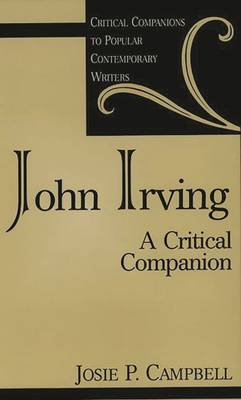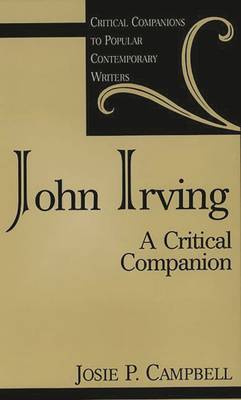
- Retrait gratuit dans votre magasin Club
- 7.000.000 titres dans notre catalogue
- Payer en toute sécurité
- Toujours un magasin près de chez vous
- Retrait gratuit dans votre magasin Club
- 7.000.0000 titres dans notre catalogue
- Payer en toute sécurité
- Toujours un magasin près de chez vous
Description
One of America's most noted contemporary novelists, John Irving has created a body of fiction of extraordinary range, moving with ease from romance to fairytale to thriller. Although his fiction follows in the tradition of the great 19th-century world novelists, he is a quintessential American writer--his novels are laced with broad humor, farce, and absurd situations. He does not hesitate to tackle the troubling issues that have faced our nation in the past few decades, such as war, racism, sexism, abortion, violence, and AIDS. This study offers a clear, accessible reading of Irving's fiction. It analyzes in turn all of his novels from Setting Free the Bears (1968) to his newest novel A Widow for One Year (1998). It also provides the reader with a complete bibliography of Irving's fiction, as well as selected reviews and criticism.
Following a biographical chapter on Irving's life, an overview of his fiction explores his work in light of his literary heritage and use of a variety of genres. Each of the following chapters examines an individual novel: Setting Free the Bears (1968), The Water-Method Man (1972), The 158-Pound Marriage (1973), The World According to Garp (1976), The Hotel New Hampshire (1981), The Cider House Rules (1985), A Prayer for Owen Meany (1989), A Son of the Circus (1994), and A Widow for One Year (1998). The discussion of each novel includes sections on plot and character development, thematic issues, and a new and fresh critical approach from which to read the novel. Campbell explores the great moral range in Irving's novels. She shows that all his novels deal with a character's quest to discover the self, a journey of raw energy that touches us because we recognize it as our own. This study will help readers to appreciate the experimental fiction that is Irving's trademark and his ability to capture the essence of American life in the last part of the twentieth century.
Spécifications
Parties prenantes
- Auteur(s) :
- Editeur:
Contenu
- Nombre de pages :
- 224
- Langue:
- Anglais
- Collection :
Caractéristiques
- EAN:
- 9780313302220
- Date de parution :
- 24-11-98
- Format:
- Livre relié
- Format numérique:
- Genaaid
- Dimensions :
- 161 mm x 241 mm
- Poids :
- 530 g

Les avis
Nous publions uniquement les avis qui respectent les conditions requises. Consultez nos conditions pour les avis.






